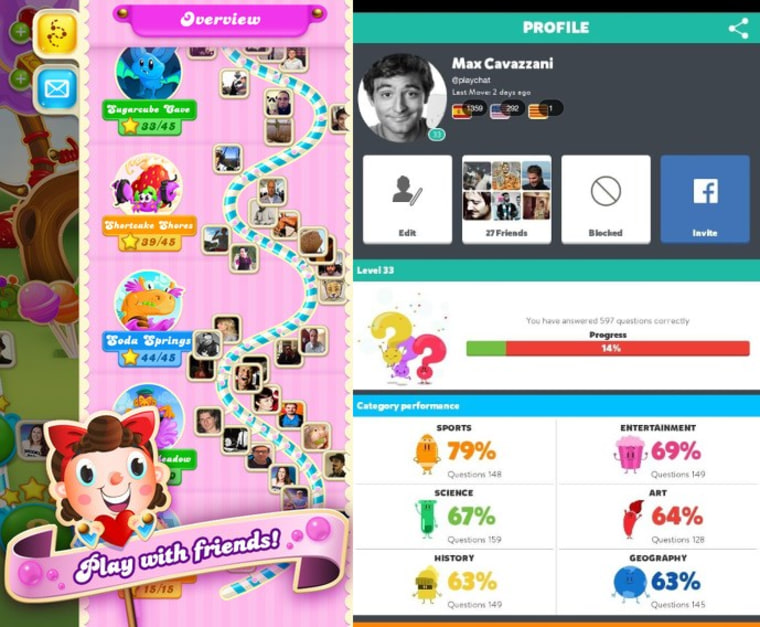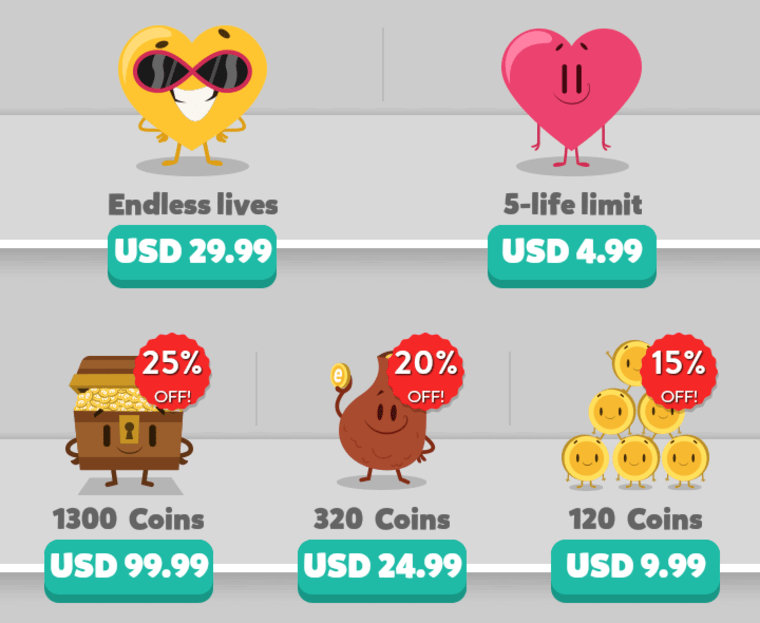Quick, before you start this article, isn't there time for a quick round of Trivia Crack? Or Candy Crush? Or Cut the Rope? Chances are you have one of those games, or one like it, installed on your phone — and perhaps find yourself unable to stop playing. What is it about these games that makes it so hard to stop? Turns out psychologists (and game designers) call it a "compulsion loop." But don't worry — despite the many players out there claiming to be addicted, it's not something anyone needs treatment for.
Trivia Crack is the latest mobile game phenomenon, a head-to-head trivia fest packed to the gills with buyable items and social features that has garnered over 100 million downloads.
"I love it. And I'm completely addicted," writes one player in an online review.
"Ever since my coworker introduced me to this app I can't stop playing!" raves another.
Trivia Crack already rivals the legendary Candy Crush Saga and Flappy Bird for out-of-nowhere success and, for developer Etermax, massive cash flow.
Each of those games is very different, but they all tap into the same basic cycle to which mobile gamers seem to be particularly vulnerable.
"You do a thing, you get rewarded for the thing, you get feedback on the thing, then you immediately get the opportunity to do the thing again," summarized Jamie Madigan, a psychologist who specializes in gaming and entertainment. "It's a really tight loop."

This pleasant ensnarement of attention is sought after by both gamers and game designers.
"From a psychological perspective, it's an opportunity for the player to feel a sense of accomplishment, to feel competent for very little effort," Berni Good, a consultant and lecturer in the emerging field of cyberpsychology, said in an email to TODAY.
"The player may well be experiencing a dopamine hit in the brain," Good said. "Dopamine is the feel-good neurotransmitter in the brain, and humans will tend to seek out opportunities for dopamine."
Combine that jolt with cute characters, the ability to play for minutes or just seconds at a time, and the chance to show off your high scores to friends, and it's not hard to see that games in this mold are designed to suck up as much of your (and your friends') time as possible. But "addiction" isn't the right word for it, said Madigan.
"I think 'habit-forming' is more accurate than 'addictive.' You don't have withdrawal or any of the other hallmarks of addiction. You build the small habit of playing into larger habits, like your morning coffee — it becomes part of a larger ritual."
That's not to say it's impossible to spend too much time banging your head against a level of Angry Birds.
"It's particularly important to be careful when developing games for children and vulnerable adults," cautioned Good. She urged game developers to employ compulsion loops in ethical ways and not exploit or exhaust the player.
In fact, a well-designed game can be conducive to mental health. A well-regulated feedback loop can put the player into a state of "cognitive flow," in which the real world falls away and the mind can rest, if only for a few minutes. "This can be beneficial for psychological health," Good explained, "a bit like what a gardener experiences when they potter around the garden."
If these games are so good for you, you may be wondering why they seem to constantly stop you from playing by limiting your lives or progression. Sure, it means the gamemakers can sell you in-game currency to get around the roadblocks, but there's another bit of psychology at play here.

"There's a concept called hedonic adaptation," says Madigan. "Basically a fancy way of saying you get used to nice things."
It's like having pancakes for breakfast every morning — too much of a good thing. "By making you take frequent breaks," Madigan said, "it fights that hedonic adaptation. It's kind of counter-intuitive."
Developers don't want you and your brain, trapped in a compulsion loop, to keep playing until you get tired or frustrated and delete the game. So they force you to stop — knowing you're going to pick it up again later.
So don't feel too bad next time you spend your whole subway ride, coffee break or lunch break puzzling over trivia or matching colored tiles. After all, you're only human — and the game designers know it.